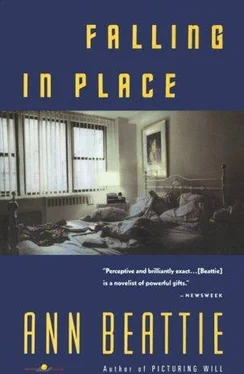Ann Beattie - Falling in Place
Здесь есть возможность читать онлайн «Ann Beattie - Falling in Place» весь текст электронной книги совершенно бесплатно (целиком полную версию без сокращений). В некоторых случаях можно слушать аудио, скачать через торрент в формате fb2 и присутствует краткое содержание. Год выпуска: 1991, Издательство: Vintage, Жанр: Современная проза, на английском языке. Описание произведения, (предисловие) а так же отзывы посетителей доступны на портале библиотеки ЛибКат.
- Название:Falling in Place
- Автор:
- Издательство:Vintage
- Жанр:
- Год:1991
- ISBN:нет данных
- Рейтинг книги:4 / 5. Голосов: 1
-
Избранное:Добавить в избранное
- Отзывы:
-
Ваша оценка:
- 80
- 1
- 2
- 3
- 4
- 5
Falling in Place: краткое содержание, описание и аннотация
Предлагаем к чтению аннотацию, описание, краткое содержание или предисловие (зависит от того, что написал сам автор книги «Falling in Place»). Если вы не нашли необходимую информацию о книге — напишите в комментариях, мы постараемся отыскать её.
Falling in Place — читать онлайн бесплатно полную книгу (весь текст) целиком
Ниже представлен текст книги, разбитый по страницам. Система сохранения места последней прочитанной страницы, позволяет с удобством читать онлайн бесплатно книгу «Falling in Place», без необходимости каждый раз заново искать на чём Вы остановились. Поставьте закладку, и сможете в любой момент перейти на страницу, на которой закончили чтение.
Интервал:
Закладка:
“Well,” he said, “I don’t see any reason why we can’t go to Nantucket.”
“Agreeable of you,” she said. “I’m surprised. Should I press my luck?”
“Why not? Go ahead.”
“It’s either you or me, and I would rather that you do it. Someone has to speak to Mary’s teacher. She won’t get credit for the course if she gets a D, and all of her papers but one are D’s.”
“What’s the matter with her?” he said.
“Ask her teacher.”
“Okay,” he said. “When?”
“Call and make an appointment.”
“Okay,” he said.
“Remember when she was born and you used to blow on the fuzz on top of her head and she liked it so well she’d close her eyes?”
She stopped on the hill above the marina and got out. He sat there while she climbed on the hood of the car again and looked at the boats bobbing. A man and a woman were dancing on the deck of one, in their bathing suits, to “Heart of Glass” on a portable radio. Down the road, he could see the cluster of cars at the soft ice-cream stand. A big black dog, the sort of dog a boy would run away with, knapsack on his back, in a Norman Rockwell painting, bounded down the middle of the street. No cars came by. He made it to the ice-cream stand, a boy about eight years old trailing behind him with a leash. It was almost dark, and he worried for both the boy and the dog. Louise was watching them, too. Probably she was thinking about her dog that had died. Years ago, before she decided that fishing was cruel, she used to fish at the marina, from the base of the hill, or from the Pendergasts’ boat. The dog went with her and sat, quiet and panting, and leaped with joy when she pulled up a fish. Then he would lick it and guard it as it flopped. The dog had immense respect for Louise, and Louise for the dog.
He got out and sat beside her. The people on the boat were summer people. The Pendergasts’ boat was there, but they weren’t on it. He was glad, because he did not want to have a drink with anybody. He thought that an ice cream would taste good. He asked Louise if she wanted to walk down.
“In a minute,” she said.
He watched her watching the boats. Her eyes were still red, and she didn’t seem to care what she looked like. She had brushed up against something and gotten dirt on her leg. She ignored him as he looked at her. Finally he looked away, into the water, almost still, inky and still, lit up by the three-quarter moon.
After a while they walked to the ice-cream stand. The big black dog was there, hanging around, begging for ice cream. The boy with the leash was nowhere around. John asked a little boy in line ahead of him if he knew where the dog’s owner was. “Nope,” the boy said. The dog was staring at John. If the dog was still there when he got to the window, he was going to buy it a dish of ice cream.
The dog was still there. He got it a large dish of vanilla, and he and Louise got vanilla cones. The dog almost dove into the dish. “Hey! Lookit the stupid dog!” one boy said, and John almost exploded. “Leave the dog alone,” he managed to say, calmly. He stood there while the boy and his friend backed off. They had been about to grab the dog’s dish. John half wished that he had let them, and that the dog had bitten them. The dog slurped and slurped. Melted ice cream ran down John’s wrist, because he forgot to keep turning the cone and licking.
As they were walking away, a girl got out of a car giggling. A boy jumped out the other side, and then another boy. It was the two Bergman boys. Andy with his long mane of nearly white hair, cowboy shirt unbuttoned except for one button above his cowboy belt. The buckle was enormous, shaped like Texas, mother-of-pearl, surrounded by a thick silver rim. Andy was the errant son— the last John had heard, Andy had flunked out of his second college and was doing lights for a band in New York. Lloyd was almost as tall as his brother, but without the mane of hair. He had on yellow aviator glasses, and he had caught up with the laughing girl and was pretending to be about to grab her, lunging and zigzagging from side to side like a basketball player blocking a shot. She had something she wasn’t giving him, and John might have found out what it was if Andy Bergman hadn’t recognized him and said hello. Then the game stopped. Angela pushed her hair out of her face and said hello very properly. She had on canvas shoes with high heels, shorts, and a tight T-shirt.
“What do you think?” Louise said, walking away, licking her cone. “Is what John Joel said true? Can you really tell by looking at them?”
They walked to the car in the dark. With his tongue cold from the ice cream, his headache felt better. He leaned against the car for a minute before he got in. He would have thought no about Nina, when actually she had been attracted to him and had been waiting for him to ask. So the fact that he thought yes about Angela probably meant no. He got in the car, chewing the last of the cone.
“What you did for the dog was nice,” she said. “You didn’t really dislike Mr. Blue, did you? Why did you act like you didn’t like my dog?”
“It just got to be a standing joke. I don’t know why.”
“But you liked him.”
“Yeah. Of course I liked him.”
“I am not going to cry,” Louise said. “I am going to drive, and if I did not cry in the restaurant I am not going to cry now.”
When they were home, in the bedroom, she lay on her side, leafing through the magazine on the floor. He looked down and saw a picture of a woman standing beside a car with its door open, her hand on the door, her foot raised, resting on the doorsill, a gold buckle on her shoe. The woman was looking off to the left. She wore a scarf, long and white, the sort Isadora Duncan must have had hundreds of. The scarf dangled down the front of a maroon velvet jacket, and beneath the jacket was a long pleated skirt, as silvery as tinsel. Behind the woman was a string of fuzzy lights. A person with cataracts would have seen the lights that way, all aura and haze. The scarf was so white you couldn’t see the texture. The woman’s fingers held the edge of the scarf, as she stood with one foot in the door, one foot on the pavement, looking away.
“Vogue,” Louise said. “Care to make a comment?”
“I like the scarf,” he said.
He went into the bathroom. Through the wall he could hear, very faintly, the radio playing in Mary’s bedroom. She did not seem to be worried about flunking English in summer school. He supposed that it was his obligation to Mary to confront her teacher and say: She told me that Vanity Fair was about how things just fall into place. She’s fifteen years old and she knows that . Why is she failing English? He would imply, of course, that the teacher was not attuned to Mary. Not stimulating her. He tried to imagine Mary stimulated. She was always lethargic, resigned, sarcastic — though she had been right about his sarcasm. She had been the one to end that game, at dinner: Mary grew weary of things. He wondered if she might be weary of her weariness. If yes meant no in Angela’s case, then no might mean yes in Mary’s. He shook the thought away. He took a shower, blasting himself with hot water. He took four Excedrin before he got into the shower. It felt as if they had lodged about six inches down his chest and were there, still and heavy, like pebbles in a pond. He soaped himself briskly. The suds came up fast. Just as fast, he rinsed them off. He cupped his hands and splashed water on his face, then held his breath and turned his face up into the spray. When he took his face out, he thought he heard “Heart of Glass,” but when he turned the water off, he realized that what he had been hearing had been a man’s voice on the radio. It was not “Heart of Glass” for the second time that day, the millionth time this summer, after all. Nick had told him that once in Boston, years ago, he had been out of money and out of food, and the woman he lived with had left to keep bees with a sixty-year-old ex-professor of Slavic languages, and his eighteen-year-old sister had just put her baby up for adoption, and the girl he had hoped would be his new girl had called to say she had drawn night duty for the rest of the week. He had been sprawled in the hot Boston apartment he shared with four other people, the window in his room jammed so that it would open only a couple of inches, wearing the same clothes he had worn for four days, with a slow, drumming toothache coming on and no money, late at night. The people in the apartment next door had come home and they had been laughing, and he knew that pretty soon he was going to have to listen to them, having more fun on their mattress than he was having on his, and the most he had been able to do was roll to the far side of his mattress. And then two amazing things had happened. A breeze had started, as strong as the low speed of a fan, a breeze after days of nothing but still air; and at the same time, from the apartment next door, a song so beautiful that he had wept but decided to stay alive: Diana Ross singing “Everything’s Good About You.” Nick credited the breeze and the song with saving his life. Nick was only five years younger than he was, but when Nick told stories like that, it broke his heart, as much as his heart broke when something terrible happened to one of his children. Actually, nothing really terrible had ever happened. A couple of frightening runs to the emergency room with infants whose fevers rose and rose and wouldn’t break, but lately — summer school? The crisis was that Mary was not doing well in summer school. He would take care of it.
Читать дальшеИнтервал:
Закладка:
Похожие книги на «Falling in Place»
Представляем Вашему вниманию похожие книги на «Falling in Place» списком для выбора. Мы отобрали схожую по названию и смыслу литературу в надежде предоставить читателям больше вариантов отыскать новые, интересные, ещё непрочитанные произведения.
Обсуждение, отзывы о книге «Falling in Place» и просто собственные мнения читателей. Оставьте ваши комментарии, напишите, что Вы думаете о произведении, его смысле или главных героях. Укажите что конкретно понравилось, а что нет, и почему Вы так считаете.












